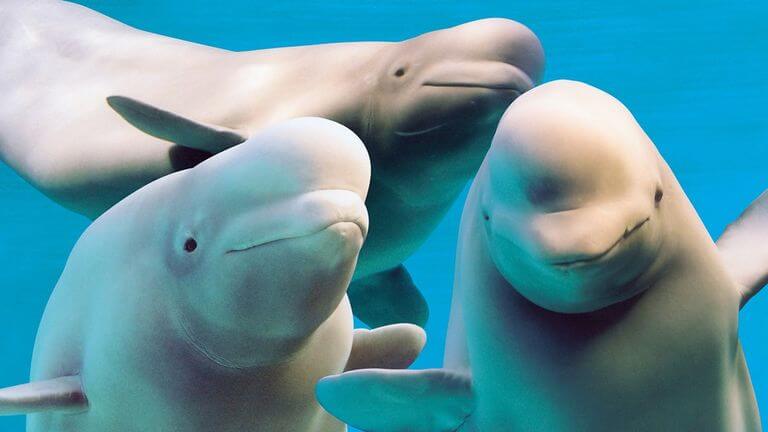A New Home for Marineland’s Belugas
The Whale Sanctuary Project (WSP) is an American non-profit dedicated to changing the way people relate to whales and dolphins by bringing an end to their exploitation and creating coastal sanctuaries, assisting with international marine mammal rescues, and advancing whale and dolphin science. People often misunderstand the behaviour of whales and dolphins. The WSP works to change that through its charity work.
A sanctuary is a place where the wellbeing of its residents is always a priority. A whale sanctuary does not engage in performances, demonstrations, or displays, allow access to animals for commercial purposes, allow breeding, or have any purposes above the well-being of the animals.
It is important to build coastal sanctuaries for whales because there has been a change in public attitudes towards keeping these intelligent and social animals in concrete tanks for entertainment.
The WSP researched over 130 locations and selected Port Hillford, Nova Scotia, to create a seaside sanctuary for whales retired from amusement parks. This sanctuary will become home to Marineland’s retired belugas.
The government of Nova Scotia has approved and issued a lease for the WSP for over 80 hectares of land and water on Nova Scotia’s Eastern shore. The proposed site will be North America’s first whale sanctuary. The WSP has waited for 3 years for the approval, which clears the path to construction and to raising the remaining capital required for the project.
Marineland, now closed, has said that the Port Hillford site is not appropriate due to historic gold mining. However, the WSP has disputed this claim. Matt Maraynes, Chief Operating Officer, said that “Port Hillford represents an ideal site for the whale sanctuary for several reasons.
First, it meets the physical criteria our team established for the sanctuary. Furthermore, the local community officials and the residents welcomed the Whale Sanctuary Project’s leadership team and embraced the idea of having the cetacean sanctuary become an integral part of their community.”
The whale sanctuary is not a project without a reason. In February 2025, Marineland said that it was looking to remove all of its surviving 31 belugas while it transitioned property to new ownership. The WSP discussed with government officials and NGOs the need for the whales to be considered a national priority.
On October 1, 2025, the Canadian government denied Marineland a permit to export 30 surviving beluga whales to the Chimelong Ocean Kingdom aquarium in China. Maraynes noted that Fisheries Minister Johanne Thompson stated in a press release that the government’s decision is consistent with the 2019 law (Bill S203, the Ending Captivity of Whales and Dolphins Act) that bans whale and dolphin captivity for the purposes of entertainment and forbids breeding.
Two days later, Marineland threatened to kill the belugas, claiming that they were running out of money without support from the federal government. Marineland has faced longstanding allegations of animal cruelty.
According to the Canadian Press, 19 belugas, one killer whale, and one dolphin have died at Marineland since 2019. However, the company said that this was part of the natural life cycle.
Maraynes stated:
"The situation facing the 30 beluga whales at Marineland Canada is unsustainable and requires urgent intervention.”
The park is no longer open to the public and is up for sale, and its rides are being sold off. “It is imperative that Marineland, Canadian federal and Ontario provincial government agencies, the Whale Sanctuary Project, other NGOs, and leaders in the captivity work together towards solutions for the whales – including bringing as many as possible to the sanctuary.”
There are a number of concerns surrounding whales in captivity. “Whales are long-lived, highly intelligent, wide ranging, and socially complex animals,” states Maraynes. He explains that in captivity, these animals’ health and wellbeing is impacted.
“Typical forms of whale captivity – like confinement to concrete tanks – have significant deleterious impacts on the overall health and welfare of these beings. Whales in captivity at marine parks and aquariums exhibit signs of chronic stress and illness, and social and sensory deprivation,” says Maraynes.
Captivity also affects the behaviour of whales and dolphins, leading them to show signs of distress. Maraynes also stated, “Most spend their time circling their tanks, often grinding their teeth on the concrete and metal. Because of the confined space, fights are frequent and can lead to serious injury.
The contrasts between those captive environments and the dynamic characteristics of a natural ocean environment clearly highlight the extent to which these animals’ fundamental needs cannot be met in concrete tanks.”
According to Maraynes, construction on this project begins in the following months, The WSP expects to welcome the first whales within six to eight months from the start of construction at the site. “We are especially grateful for all our local support, our volunteers, community liaison committee members and people throughout Nova Scotia who have helped us reach this milestone.” says Maraynes.
Charles Vinick is the WSP’s Chief Executive Officer, and oversees the development of the sanctuary. Dr. Lori Marino is a neuroscientist who founded the WSP and is the President. Bringing the whales over is no easy feat. “Transporting the whales to the sanctuary will entail truck transport from Marineland Canada to a nearby airport, air transport to Halifax, Nova Scotia, and then truck transport from Halifax to the sanctuary site in Sherbrooke, Nova Scotia,” says Maraynes.
The WSP raises donations from its global supporter base through its website. They also apply for grants from private, non-governmental foundations and family funds, and have several major donors who contribute monthly and annually. They are now seeking angel donors to raise the capital campaign funds needed to complete the sanctuary — a place that will finally offer Marineland’s belugas a life beyond concrete walls and public display.
To learn more about organizations working to protect animals and marine life, explore other animal welfare charities featured on CharityAxess. These organizations are making a difference through rescue, rehabilitation, and advocacy efforts across Canada and beyond.
About the Writer: Abirame Shanthakumar is a volunteer writer with CharityAxess who is passionate about animal welfare, environmental issues, and global development. She has written on topics such as engineering, sustainability, and poverty alleviation, using her writing to highlight the role of charities in driving positive change. In her spare time, Abirame enjoys reading, writing fiction, and spending time outdoors with a good cup of coffee in hand. Her work with CharityAxess reflects her strong belief in advocacy, compassion, and storytelling for impact.
Beluga whales at Marineland - Photo by Marineland Canada





